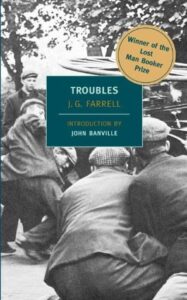 When a world is collapsing all about us, how much are we willing to recognize?
When a world is collapsing all about us, how much are we willing to recognize?
J. G. Farrell’s description of a veteran of the World War I trenches going to Ireland to rejoin a young lady he had met only once in London during the War is an allegory on human inertia and lethargy in the face of rapid change.
In 1919, Major Brendan Archer travels from London to Kilnalough, Ireland, thinking to ask Angela Spencer to join him in marriage, even though he could not remember ever asking her outright to do so. He finds an elusive young lady and a scene of inertia and decay.
Ireland has entered the “Troubles” with Sinn Fein pushing for complete separation from the British Empire. And that Empire is collapsing just as the Majestic Hotel, owned and operated by Angela’s father, Edward, the scene of the entire novel, is doing the same.
Farrell gives us the Hotel dominated by “dust.” Every page describes dust, “mould”, gloom, creepers, grime, cobwebs, collapsing floors, “man-eating” plants, and an ever-expanding entourage of reproducing cats. One room featured “an enormous greyish-white sweater that lay in one corner like a dead sheep.”
The weather wasn’t any better: “it rained all that July,” and the hotel residents complained of the coming “dreadful gauntlet of December, January, February.” Both the hotel and Ireland exuded “an atmosphere of change, insecurity and decay.” But the residents continued to follow life’s rituals: prayers at breakfast, afternoon teas, dressing for dinner, and whist in the evening.
Add to this mordant scene the author’s interjection of gloomy news reports from around the world: White Russians and English military supporters being trounced in Russia, victorious Boers in South Africa, a mess in Mesopotamia and Egypt, rebellion in Poland, and, finally, the Indians attempting to remove themselves from British rule.
In the face of all this, the hotel’s owner and operator, Edward Spencer aggravates the Major: “ … his overbearing manner; the way he always insisted on being right, flatly stating his opinions in a loud and abusive tone without paying any attention to what the other fellow was saying.”
Does this also describe the Brits in other sections of the world?
The Major remains always a drifter “with the tide of events,” never able to respond, dominated, it seems, by “the country’s vast and narcotic inertia.”
This is a story of the collapse of a hotel, descending at last into ashes, and an allusion to the similar collapse of the British Empire, with the Second World War being its enormous fire. It is a compelling read, one that suggests some connections to the events of the second decade of the 21st century …
Editor’s Note: ‘Troubles’ by J. G. Farrell is published by Weidenfeld & Nicolson, London in 1970.

Felix Kloman
About the Author: Felix Kloman is a sailor, rower, husband, father, grandfather, retired management consultant and, above all, a curious reader and writer. He’s explored how we as human beings and organizations respond to ever-present uncertainty in two books, ‘Mumpsimus Revisited’ (2005) and ‘The Fantods of Risk’ (2008). A 20-year former resident of Lyme, Conn., he now lives in Peabody, Mass. He writes book reviews, mostly of non-fiction, a subject which explores our minds, our behavior, our politics and our history, but he does throw in a novel here and there. For more than 50 years, he’s put together the 17 syllables that comprise haiku, the traditional Japanese poetry, and served faithfully as the self-appointed “poet laureate” of Ashlawn Farm Coffee. His late wife, Ann, was also a writer, but of mystery novels, all of which begin in a village in midcoast Maine, strangely reminiscent of the town she and her husband visited every summer.